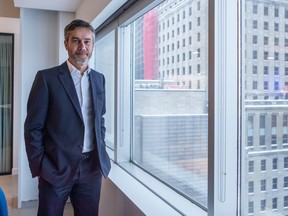“It’s premature to make an announcement but I’m very optimistic,” says Investissement Québec chief executive Guy LeBlanc.

Quebec’s investment and financing agency is confident of luring an electric vehicle battery maker as part of a multi-billion-dollar effort to create a major supply hub for the car industry.
Discussions with various lithium-ion battery manufacturers over the possibility of setting up a production facility in the province are at an “advanced” stage, Investissement Québec chief executive Guy LeBlanc said in an interview. He didn’t identify the companies, given the confidential nature of the negotiations.
Sign up to receive daily headline news from the Montreal Gazette, a division of Postmedia Network Inc.
Thanks for signing up!
A welcome email is on its way. If you don't see it, please check your junk folder.
The next issue of Montreal Gazette Headline News will soon be in your inbox.
Lithium-ion battery cells are one of the key areas that Quebec is targeting as the province seeks to build an industrial base in electric propulsion systems. While competition from other jurisdictions is fierce, Quebec can offer foreign investors access to rich deposits of strategic minerals such as copper, graphite and lithium; relatively cheap hydroelectric power; expertise in assembling electric buses, trucks and components; and a proximity to U.S. and Ontario carmakers.
“It’s premature to make an announcement but I’m very optimistic” of attracting an electric battery maker to Quebec, LeBlanc, who has been running IQ since 2019, said in Montreal. “One of the reasons I joined IQ was to ensure that the battery sector would be put in place.”
Several global companies have already unveiled plans to invest in Quebec and start making components used in the production of electric vehicle batteries. South Korea’s POSCO Chemical said in March it would team up with General Motors to build a US$400-million plant in Bécancour that will produce material for EV batteries, while German chemicals giant BASF purchased land — also in Bécancour — for a future cathode active materials and recycling site.
By 2030, combined investments in Quebec’s electric battery sector could reach $10 billion, LeBlanc said. Some of the industrial facilities planned for Bécancour will start operating as soon as 2025.
“If you are serious about your eco-responsibility, there is only one place in North America where you can produce, and that’s Quebec,” LeBlanc said, highlighting the eco-friendliness of hydroelectricity relative to coal or natural gas.
“Three years ago, we were wondering whether we were going to have a battery industry. Today we are asking ourselves with which players we are going to work.”
And although Hydro-Québec is forecasting current power surpluses will disappear by the end of 2026, “we will have the necessary energy to meet the needs” of the electric-battery industry, LeBlanc insisted.
New battery projects are one of the reasons foreign direct investment in Quebec for the current 12-month period ending in March will “greatly exceed” last year’s $4.6 billion threshold, Leblanc said. He declined to provide a specific figure.
Activity in life sciences is also driving the rise in foreign investment. After playing a role last year in convincing U.S. vaccine maker Moderna to build an estimated $180-million production facility in Laval, LeBlanc hints other biotech companies may eventually follow suit.
Life sciences are “a very active file for us,” he said. After Moderna, “there could be other plants, but what’s even more important for me is the ecosystem that we want to create. We’re not trying to set up a ton of factories in Quebec. What we want is to be champions in a certain number of sectors.”
Besides electric batteries and life sciences, priority industries include aerospace, agri-foods, aluminum, artificial intelligence, natural resources and technology, he said.
“I’m extremely optimistic for the future of Quebec and for the strategy that we have for Quebec,” LeBlanc said.
An accountant by training, LeBlanc was named CEO of IQ after a two-decade career that included a stint as managing partner of PricewaterhouseCoopers’ Montreal office. He has experience in areas such as business acquisitions and financing.
A year after his appointment, Quebec incorporated the Economy Ministry’s regional offices into IQ. It also gave the agency responsibility for the Centre de recherche industrielle du Québec, the province’s state-owned industrial research centre. The moves aimed to make it easier for entrepreneurs to get both advice and financing under one roof.
As a result, IQ now counts about 1,200 employees, more than double its 2019 head count. About 500 people focus on giving business advice to Quebec companies and helping them boost productivity through such means as new technologies, LeBlanc said.
That advice may come in handy as developed economies enter a slowdown that many analysts are predicting will morph into a recession.
“2023 will probably be the most difficult year,” LeBlanc said. Already in Quebec, “we see several problem situations appearing. There are companies that will need to refinance, to restructure, to reconsider their business plan.”
“The challenge for us will be to accompany companies so that they continue to invest.”
ftomesco@postmedia.com
-

Power-hungry Quebec will soon need more hydro dams, Legault says
-

Canadian economy slowing and recession possible in 2023: economists


